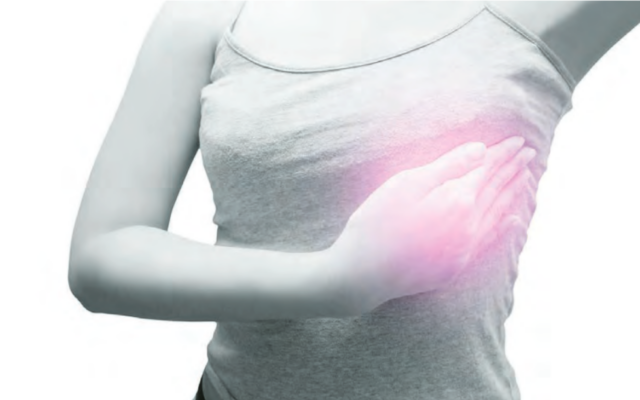Being ‘breast aware’ is just the start
'Ashkenazi Jewish women are more likely to have breast cancer and to develop it at a younger age due to BRCA1 and BRCA2 gene mutations.'
When I recently found out I had breast cancer at age 39 it came as a shock. When I first felt a hard lump after breastfeeding my toddler, I had hoped it was breastfeeding related, but I went to the GP to check it out. My doctor sent me for an ultrasound and biopsy, which confirmed it was breast cancer, and my world was turned upside down.
Since then I have learnt a lot about breast cancer. I have learnt that statistically in Australia one in seven women will have breast cancer. I have also learnt that Ashkenazi Jewish women are more likely to have breast cancer and to develop it at a younger age due to BRCA1 and BRCA2 gene mutations.
Ashkenazi Jews have a one in 40 chance of carrying a BRCA1 or BRCA2 gene mutation which is around 10 times higher than the general population. For women carrying a BRCA mutation the risk of developing breast cancer is around 50 per cent to 80 per cent, and the risk of ovarian cancer between 10 per cent to 45 per cent.
Thankfully, initiatives to encourage Jewish community genetic testing, such as the JeneScreen project, have widely tested for BRCA gene mutations. If a gene mutation is found, then a person can choose to increase surveillance or have risk reduction surgery. However, some community screenings only focus on gene faults for the BRCA1 and BRCA2 commonly found in the Jewish community, and do not screen for the full BRCA panel, so further testing may be required depending on a person’s family history of cancer.
I have also learnt that breast cancer is the second leading cause of death from cancer in women in Australia. That while the stage one survival rate is around 90 per cent, that is just for the first five years, and that around 20 to 30 per cent of people with an earlier-stage breast cancer will develop metastatic breast cancer which is currently incurable.
I have learnt that there are different types of breast cancer, some more aggressive than others, and each person will have their own unique experiences and challenges.
But what has shocked and angered me greatly, is the lack of early screening for women under 40. In Australia, breast cancer is the most commonly diagnosed cancer for women aged 20-39, with around 1000 new cases of breast cancer diagnosed each year.
While that is still considered statistically low, breast cancer is the leading cause of death from cancer for women under 40 in Australia. Breast cancer in young women is often more aggressive and found at a later stage than in older women.
Younger women also face unique challenges from a breast cancer diagnosis – side effects of treatments may affect their ability to care for young children, take away their fertility, and it can negatively impact career or study aspirations.
In Australia, women over 40 with a family history of cancer are able to access a free mammogram every two years, while women aged 50-74 receive an invitation every two years to attend a mammogram, as 75 per cent of breast cancers occur in women aged 50-74.
But what are the options for women under 40? According to charity So Brave, in Australia there are currently no free breast screenings programs for women in their 20s and 30s, unless a person is high risk and then there are often costs involved. Instead, young women are told to be “breast aware” – to look for changes in the breasts including lumps, rashes and nipple changes. While being “breast aware” is incredibly important, some breast cancers do not result in lumps, and waiting to find a lump can impact a person’s prognosis. Moreover, family history only explains around 15 per cent of breast cancers in young women.
Mammograms are not offered routinely to women under 40 because they are considered less effective, as younger women have more dense breasts. But there are other options for early screening including breast MRIs, ultrasounds and contrast-enhanced mammography. Speaking with doctors, it appears the challenges are that ultrasounds can be less effective if it is not clear what you are looking for, that there are issues with the availability of MRIs and concerns with the health impact of regular use of contrast dye.
Since talking openly about my journey and calling for early screening, I have received messages from people in the Jewish community who have tragically lost family members because breast cancer was found too late. Given the lack of attention to early screening for young women, it is important that young women, especially those who are Ashkenazi and/or have a family history of cancer, are proactive about their health and talk to their doctors about genetic testing and options for early screening.
Research is vital to improving screenings and treatments for breast cancer. That is why this Sunday I will be supporting the National Breast Cancer Foundation’s Mother’s Day Classic which raises funds for breast cancer research, and I hope you will too.
Sharyn Kolieb is deputy editor of The AJN. She is currently on extended leave while she undergoes treatment for breast cancer.


comments